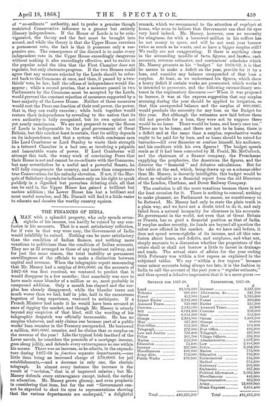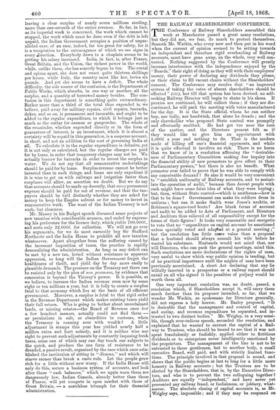THE FINANCES OF INDIA.
AMAN with a splendid property, who only spends seven- eighths of his income, can hardly be ruined by any con- fusion in his accounts. That is a most satisfactory reflection, for if ruin in that way were easy, the Government of India would infallibly be ruined. Nothing can be more satisfactory than the condition of Indian finance, and nothing more vexatious to politicians than the condition of Indian accounts. They are as ill arranged as those of any insolvent railway, and for just the same reason, the total inability or permanent unwillingness of the officials to make a distinction between capital and revenue. When the telegraphic report announcing that Mr. Massey had a surplus of 800,0001. on the accounts of 1867-68 was first received, we ventured to predict that it would disappear in a few months ; that somebody was sure to have made some blunder of a million or so, most probably in compound addition. Only a month has elapsed and the sur- plus has already disappeared, while the blunder turns out much worse than we had, half in joke, half in the earnestness begotten of long experience, ventured to anticipate. If a French Minister had made it he would have been accused at once of rigging the market, and though Mr. Massey is utterly beyond any suspicion of that kind, still the wording of his telegraphic despatch was officially inexcusable. He has no surplus whatever, and only claims one because part of a public works' loan remains in the Treasury unexpended. He borrowed a million, 800,0001. remains, and he claims that as surplus on the revenue of the year 1 Like the typical Irish landlord of the Lever novels, he considers the proceeds of a mortgage income, goes along jollily, and defends every extravagance as one within his means. There was an increase, as he admits, in the expendi- ture during 1867-68 in fourteen separate departments,-one little item being an increased charge of 570,0001. for jail establishments,-and a decrease in only one, the electric telegraph. In almost every instance the increase is the result of "revision," that is, of improved salaries ; but Mr. Massey defends every extravagance except, indeed, the outlay on education. Mr. Massey grows gloomy, and even prophetic in considering that item, but for the rest " Government can- not be ekpected to shut its eyes to representations showing that the various departments are underpaid," a delightful remark, which we recommend to the attention of employe's at home, who seem to believe that Government can shut its eyes very hard indeed. Mr. Massey, however, sees no necessity for stinginess, for with a borrowed million in his coffers has he not money to spare, and will he not next year borrow twice as much as he wants, and so have a bigger surplus still? We really are not exaggerating. If there is anything clear in the astounding muddle of facts, figures, and faneies, cash accounts, revenue estimates, and contractors' schedules which Mr. Massey presents as his " budget " for 1868-69, it is that he means to make a deficit on the year, provide for it by a loan, and consider any balance unexpended of that loan a surplus. At least, so we understand his figures, which show a heavy deficit if certain works are prosecuted, which works it is intended to prosecute, and the following extraordinary sen- tence in the explanatory discourse :-" When it was proposed to borrow, it was at the express suggestion that any surplus accruing during the year should be applied to irrigation, so that this unexpended balance and the surplus of 800,000/. would preclude the necessity for any loan on the Budget for this year. But although the estimates now laid before them did not provide for a loan, they were not to suppose there would be no loans. There would be loans, and heavy ones too." There are to be loans, and there are not to be loans, there is a deficit and at the same time a surplus, reproductive works ought to be paid for by loan, and so loans should be raised for barracks-did ever financier so confuse himself, his audience, and his creditors with his own figures ? The budget speech reads as if it had been concocted by M. Fould, Mr. McCulloch, and the chairman of a finance company, the Frenchman supplying the prophecies, the American the figures, and the director the " financial " and delusive calculations. But for the table at the end, which, being drawn up on a scheme older than Mr. Massey, is decently intelligible, this budget would be about as valuable as a financial report from the old Directors of the London, Chatham, and Dover Railway Company.
The confusion is all the more vexatious because there is not the least occasion for it. There is nothing to conceal, nothing to make pleasant, no Parliament to amuse, no constituency to be flattered. Mr. Massey had only to state the plain truth in a plain way, and we have not a doubt tried to do it, and only failed from a natural incapacity for clearness in his accounts. No government in the world, not even that of Great Britain or Prussia, has so good a financial position as that of India. If surplus makes security, its funds are beyond all question the safest now offered in the market. As we have said before, it does not spend seven-eighths of its income, and all this con- fusion about loans, and deficits, and surpluses, and what not, simply amounts to a discussion whether the proprietors of the estate shall or shall not borrow a little to invest in drainage and roads. The actual state of affairs for the year ending 30th February was within a few rupees as explained in the subjoined tables. We say " within a few rupees " because some minor accounts being always too late, it is the fashion in India to call the account of the past year a " regular estimate," and thus spread a delusive impression that it is a mere guess :-
REVENUE FOR 1867-68..c EXPENDITURE, 1867-68.
X Land 20,103,600 Interest 3,537,500 Tributes 698,400 Allowances, &c 341,700 Forest 412,900 Land 1,935,600 Liquor Excise 2,282,800 Forest 280,600 Assessed Taxes 658,000 Excise 251,500 Customs 2,545,000 Assessed Taxes 32,900 Salt 6,024,300 Customs 209,000 Opium 8,814,200 Salt 353,300 Stamps 2,393,900 Opium 1,863,200 Mint 237,300 Stamps 90,800 Post Office 652,300 Mint 118,400 Telegraph 272,000 Post Office 486,600 Law and Justice 734,400 Telegraph 627,800 Police 261,700 Village Officers 398,200 Marine 259,200 Administration 1,057,300 Education 73,400 Law 2,488,900 Interest 227,600 Police 2,383,200 Miscellaneous 438,800 Marine 713,000 Army ditto. 719,000 Education 786,200 Public Works 479,500 Ecclesiastical 155,500
Medical 315,500
Stationery 205,800
Embassies 237,600
Political Allowances 2,062,600
Miscellaneous 443,600
Superannuation 625,900
Army 12,889,900
Home Expense 6,851,400 Total £48,258,300 Total £41,645,300
leaving a clear surplus of nearly seven millions sterling, more than one-seventh of the entire revenue. So far, in fact, as its imperial work is concerned, the work which cannot be stopped, the work which must be done even if the debt is left unpaid, the Indian Government occupies a position of unpar- alleled ease, of an ease, indeed, far too great for safety, for it is a temptation to the extravagance of which we see signs in every direction. Everybody down to a chaplain seems to be getting his salary increased. India, in fact, is, after France, Great Britain, and the Union, the richest power in the world, while, unlike them, she has scarcely begun to tax. The rental and opium apart, she does not exact quite thirteen shillings per house, while Italy, the country most like her, levies six pounds. And yet she seems to have a deficit. The whole difficulty, the sole source of the confusion, is the Department of Public Works, which absorbs, in one way or another, all the surplus, and a quantity of borrowed money besides. The con- fusion in this department is something quite extraordinary. Rather more than a third of the total thus expended is, we believe, paid away for military repairs, civil repairs, barracks, dykes, and so on, is permanent and incurable, and ought to be added to the regular expenditure, to which it belongs just as much as the outlay for cannon or gunpowder. The whole of the remainder, whether expended directly or in the form of guarantees of interest, is an investment, which it is almost a certainty will be repaid in this generation, is a suspense account, in short, and not an addition to the cost of governing India at all. To calculate it in the regular expenditure is delusive, yet it is not only so calculated, but the regular charges are paid for by loans, in order that temporary charges may not be. We actually borrow for barracks in order to invest the surplus in water. We do not say that all remunerative undertakings should be paid for by loans. Surplus revenue cannot be better invested than in such things, and loans are only expedient if it is wise to get on with railways and irrigation faster than surpluses will allow, an assertion we doubt. But we do say that accounts should be made up decently, that every permanent expense should be paid for out of revenue, and that the tax- payers should be told distinctly whether they are asked for money to keep the Empire solvent or for money to invest in remunerative work. The want of the Indian Treasury is not cash, but clearness.
Mr. Massey in his Budget speech discussed some projects of new taxation with considerable acumen, and ended by express- ing his preference for the licence duty, which yields 700,0001., and costs only 32,0001. for collection. We will not go over his arguments, for we do most earnestly beg Sir Stafford Northcote and the India House to prohibit all new taxation whatsoever. Apart altogether from the suffering caused by the incessant imposition of taxes, the practice is rapidly demoralizing the administration. As long as any deficit can be met by a new tax, levied without resistance or apparent oppression, so long will the Indian Government forget the healthiness of thrift, and yield day by day more easily to plausible demands. The pressure on the Treasury out there can be resisted only by the plea of non possumus, by evidence that concession is beyond the Viceroy's power. It is possible, as we believe, to increase the Indian revenue even now by some eight or ten millions a year, but it is folly to create a surplus fatal to that economy which lies at the basis of all efficient government. Moreover, a surplus is fatal to that rigid order in the Revenue Department which makes existing taxes yield their full return. Who is going to bother about unreclaimed lands, or missing estates—the Board of Revenue once lost a few hundred manors, actually could not find them or peculations in salt, or absurdities in customs, when the Treasury is running over with wealth ? A little adjustment in stamps this year has yielded nearly half a million extra and hurt nobody, and it is neither wise nor right to prevent such adjustments by constantly imposing fresh taxes, some one of which may one day touch our subjects to the quick, and produce the one form of resistance to be dreaded, a passive revolt, organized by the race which once esta- blished the institution of sitting in " dhurna," and which will starve sooner than break a caste rule. Let the people grow rich for a little without new worry. If the India House will only do this, secure a business system of accounts, and look after those " cash balances," which we again warn them are dangerously low, Indian Consols, already better than those of France, will yet compete in open market with those of Great Britain, — a matchless triumph for their financial administration.































 Previous page
Previous page